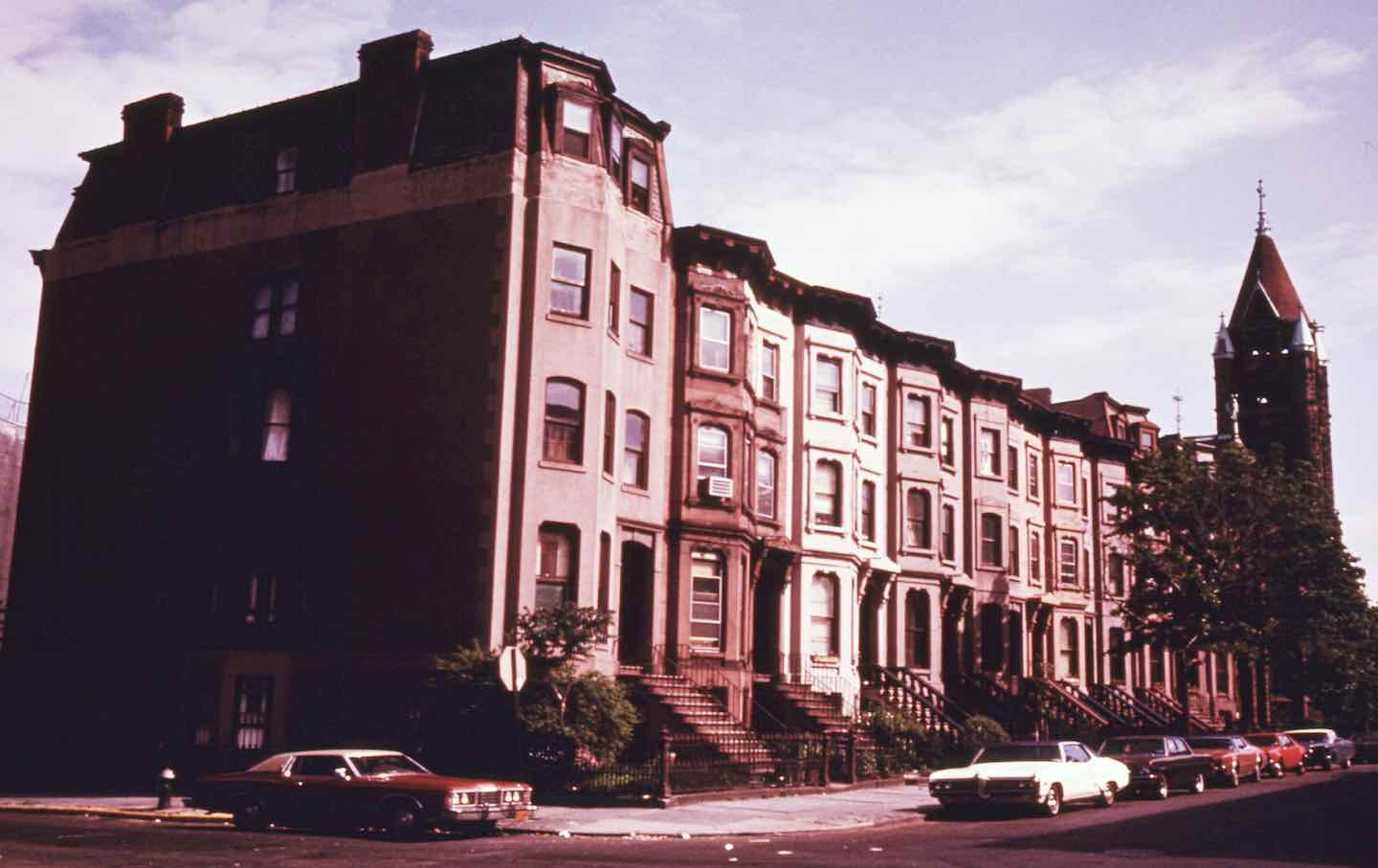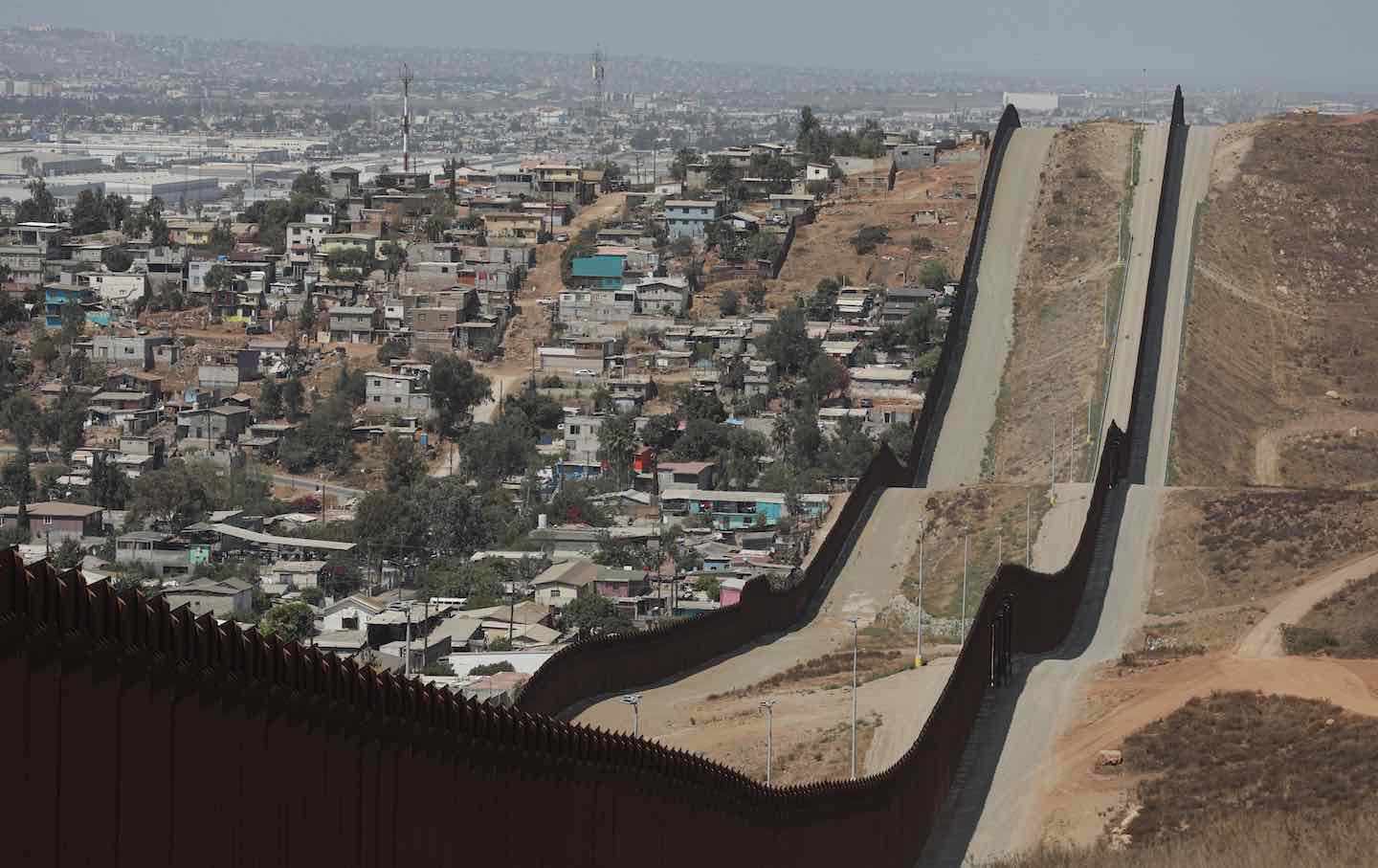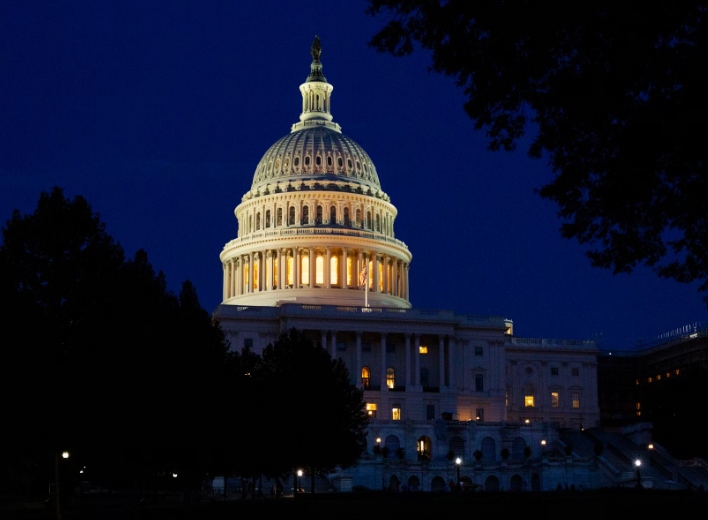Culture
/
StudentNation
/
September 18, 2024
There has been an effort to negate Fanon’s ideas and sever them from the people of Palestine. But in his work, I find the beginning of a credible path towards liberation.
Ad Policy
Frantz Fanon at a press conference in 1959.
(Wikimedia)
This story was produced for StudentNation, a program of the Nation Fund for Independent Journalism, which is dedicated to highlighting the best of student journalism. For more Student Nation, check out our archive or learn more about the program here. StudentNation is made possible through generous funding from The Puffin Foundation. If you’re a student and you have an article idea, please send pitches and questions to [email protected].
On a biting day last March, I sought shelter in a basement lecture hall where I hoped, finally, we would stop beating around the bush. My social theory survey class had discussed the communist revolution with Karl Marx, “the revolution that never happened” with Simone de Beauvoir, and was now turning to the national revolution, convening for our lecture on Frantz Fanon. By that time, Israel had killed more than 32,000 Palestinians in Gaza in its brazen campaign of genocidal bombing and starvation.
We were assigned readings from Black Skin, White Masks and The Wretched of the Earth. I anticipated our discussion to center the latter, but Fanon’s anti-colonial treatise, written against the backdrop of the Algerians’ struggle for independence from France, was squeezed into the tail end of the two-hour lecture. Our professor closed with a frantic footnote: “I just want to caution you against thinking of Fanon as the bloodthirsty celebrator of violence he’s often made out to be.”
I was disturbed. That same sentiment seems to have made its way to center stage in the months since October 2023, crowding out an honest, intellectual reappraisal of Fanon’s work. Most notably, in “Vengeful Pathologies,” the widely circulated essay by Adam Shatz—who recently published a new biography on Fanon—the argument has been advanced: All that is inflammatory in “On Violence,” the first chapter of The Wretched of the Earth, is to be qualified, viewed in a larger context, and, ultimately, negated. Fanon must not be taken at his word.
The argument goes that Jean-Paul Sartre’s infamous, incendiary preface to The Wretched of the Earth ran away with the book, and served to associate Fanon chiefly with the glorification of violence. Indeed, in the context of Algeria, it was Sartre and not Fanon who wrote: “In the first phase of the revolt, killing is a necessity: killing a European is killing two birds with one stone, eliminating in one go oppressor and oppressed: leaving one man dead and the other man free.”
Outside of the militant left, Sartre’s words were hardly ever popular: not to Hannah Arendt—who scorned the preface in “On Violence” (1970)—and not to a sizable crowd who, in the decades since, have snuffed out even the mere mention of Fanon in reference to the contemporary world, lest it falsely rile up the left-leaning youth.
In recent months, though, this crowd has gotten louder, and more forceful. If Sartre fanned the flame, then in these past few months writers and academics have tried their hardest to extinguish it.
Current Issue
This turn doesn’t come out of nowhere. I’d thought the unbearable violence of Israel’s genocide and its decades-long settler colonialism would invigorate a closer reading of Fanon, close enough to give guidance in our obfuscated moment, but I was wrong. The effort to terminally trouble Fanon’s relationship to violence cloaks a pernicious move to deny him to the Palestinian people.
If we leave the record at that, I believe we do Fanon—and, indeed, the people of Palestine—a great injustice.
Just as recent writings on Fanon have sought to neuter him, they also seem intent on observing and even stretching further the gulf between Fanon’s Algeria and today’s Palestine, so as to make the two incommunicable to each other. The so-called “question of Palestine” is framed as a situation altogether new, an anomaly too complex to diagnose, let alone solve. The door between Palestine and any emancipatory project or theory that has come before it is closed, and left outside is the world Fanon described.
But to read The Wretched of the Earth today is to discover that Fanon comes frighteningly, uncannily close in directing us to think about the Palestinian quest for liberation.
In October 2003, Tony Judt declared the two-state solution over. “The Middle East peace process is finished,” he wrote. “It did not die: it was killed.” Twenty years later, Abdaljawad Omar, a Palestinian writer, saw October 7 rising out of its ashes, out of “the absence of a clear political path forward…the exhaustion of political, diplomatic, and legal avenues.” (And for those who prescribe Gandhi-style nonviolence to the Palestinians, who could forget Israel’s brutal suppression of the Great March of Return in 2018–19, with 214 Palestinians killed and over 36,000 injured?)
What then? If the political road is closed, and the road of resistance, violent and nonviolent alike, is closed too, what ought the Palestinian people do to win their freedom?
Fanon, as he wrote The Wretched of the Earth in 1961, the year of his death, was buoyed by the winds of change that had brought decolonized, independent states into being across Africa. News from the rest of the continent gave Fanon the optimism to write that “the peoples of the Third World are in the process of shattering their chains, and what is extraordinary is that they succeed.” He had one exception in mind, though: “The truth is that no colonialist country today is capable of mounting the only form of repression which would have a chance of succeeding, i.e., a prolonged and large scale military occupation.”
As Israel uses starvation as a weapon of war in Gaza, it is embarking on a parallel effort to starve the Palestinian people of hope. Israel, with the support of the United States, has turned October 7 into the sole reason for the Palestinian people’s continued suffering and slaughter. Israel has made it clear that with every bomb it is teaching a lesson: Resistance is futile; resist at the risk of annihilation. The Palestinian’s suffering, Israel declares to the world, is all the fault of the Palestinians for daring to resist.
Ad Policy
Fanon understood this, paraphrasing speech he often saw turned against the colonized: “What aberration of the mind drives these famished, enfeebled men lacking technology and organizational resources to think that only violence can liberate them faced with the occupier’s military and economic might? How can they hope to triumph?”
Fanon acutely approximates the Palestinian predicament. He understood what it meant for oppressed people to face military might. When Fanon’s words are belied or neutered at precisely the moment when Palestinians are calling for the world to help keep them from annihilation, the implicit message is that the only moral thing for the Palestinian people to do is stand beneath the falling bombs.
Those who have branded themselves as friends of Palestine pre–October 7 have often been among the loudest in nullifying Palestinian resistance since. They affirm the right of oppressed peoples to resist in the abstract, but insist that Hamas’s attack was outside the bounds of the right to resist—too inhumane, depraved, barbaric even. Any attempt to enlist Fanon to argue otherwise is misguided, vulgar. Seemingly in response to such voices, Fanon wrote, “During the period of decolonization the colonized are called upon to be reasonable.”
Popular
“swipe left below to view more authors”Swipe →
Though I first came to the text of The Wretched of the Earth this past semester, Fanon was an almost permanent fixture of my upbringing in a post-colonial, post-apartheid South Africa trying to understand where it all went wrong. No words were more ingrained into my mind than those at the beginning of “On National Culture,” The Wretched of the Earth’s fourth chapter: “Each generation must, out of relative obscurity, discover its mission, fulfill it, or betray it.”
My question was this: What mission did Fanon identify for himself and for his generation? I read on: “For us who are determined to break the back of colonialism, our historic mission is to authorize every revolt, every desperate act, and every attack aborted or drowned in blood.”
In the original French, Fanon uses the verb ordonner—variously translated as “authorize,” “sanction,” “ordain.” If we understand “Colonial War and Disorders” as Fanon attending to the self-injurious, regrettable implications of gratuitous violence against the oppressor, then this passage in “On National Culture” shows him reckoning with those implications. And yet, he insists on the word “every,” because he believed that familiarity with colonialism’s horror meant an understanding of the horror that could (and would) be turned back against it.
Hamas’s vision of liberation and how to achieve it differ from what mine might be, and I hardly celebrate its government in Gaza, but I reject the idea that in trying to understand Hamas’s position within the Palestinian political landscape critically, I’ve discarded my intellect and merely belong to “a cult of force.”
Fanon did not rejoice at acts of armed struggle he might have found reprehensible, but he did not condemn them either. He understood where they came from, and where those who carried them out thought they were going: the destruction of colonialism. Fanon, too, might have recoiled at the violence he saw, but his mission was, nonetheless, to authorize it, because ultimately he wanted every act of violence—that of the colonizer and the colonized—to end.
What was missing in the lecture I attended, and in this new wave of writing, is the central purpose of Fanon’s work: the defeat of colonialism. Fanon was a complex, varied thinker, one who attended to the ambivalences of the struggle against colonialism. But he did so, always, as someone struggling against colonialism. He understood, for instance, that it was indeed possible to read across space and time, writing, “The great victory of the Vietnamese people at Dien Bien Phu is no longer strictly speaking a Vietnamese victory. From July 1954 onward the colonial peoples have been asking themselves: ‘What must we do to achieve a Dien Bien Phu?’”
And he does not shy away from undertaking acts of temporal and geographical translation. “We should never lose sight of the fact that this struggle could have broken out anywhere,” he maintains. “Even today it can break out anywhere where colonialism intends to stay.”
Fanon was unflinching in his description of the perils of violent resistance because he wanted us to think imaginatively about the road to freedom—and to contend with all that it includes. To Fanon, the implications of the defeat of colonialism were not merely a new nation but a new man, an entirely new humanism. There are many ways of thinking that emanate from single lines in The Wretched of the Earth. I’m not sure that any one reader can fully get Fanon. The question is, which view does one put one’s weight behind? How does one choose to present Fanon? And to what end?
There is fruit in reading Fanon in search of a credible path to liberation for the people of Palestine. Fanon is worth returning to for those of us invested in the freedom of the Palestinians in much the same way that Shakespeare is worth returning to for readers of literature: the granting of a common language, a common point of departure. And like all oppressed people, the Palestinians have not just the right, but also the imperative to resist. They must be allowed to determine what that resistance looks like. They must be allowed to ask: What will a free Palestine look like? What must we do to realize it?
Pages of The Wretched of the Earth cannot be ripped out and stuck in place of a Palestinian emancipatory manifesto, but they exclaim something crucial: a nation, much like hope, is forged in resistance.
We need your support
What’s at stake this November is the future of our democracy. Yet Nation readers know the fight for justice, equity, and peace doesn’t stop in November. Change doesn’t happen overnight. We need sustained, fearless journalism to advocate for bold ideas, expose corruption, defend our democracy, secure our bodily rights, promote peace, and protect the environment.
This month, we’re calling on you to give a monthly donation to support The Nation’s independent journalism. If you’ve read this far, I know you value our journalism that speaks truth to power in a way corporate-owned media never can. The most effective way to support The Nation is by becoming a monthly donor; this will provide us with a reliable funding base.
In the coming months, our writers will be working to bring you what you need to know—from John Nichols on the election, Elie Mystal on justice and injustice, Chris Lehmann’s reporting from inside the beltway, Joan Walsh with insightful political analysis, Jeet Heer’s crackling wit, and Amy Littlefield on the front lines of the fight for abortion access. For as little as $10 a month, you can empower our dedicated writers, editors, and fact checkers to report deeply on the most critical issues of our day.
Set up a monthly recurring donation today and join the committed community of readers who make our journalism possible for the long haul. For nearly 160 years, The Nation has stood for truth and justice—can you help us thrive for 160 more?
Onwards,Katrina vanden HeuvelEditorial Director and Publisher, The Nation
More from The Nation

In Courtney Thorsson’s cultural history The Sisterhood, she details how intimate gatherings played a role in the golden age of Black women’s writing.
Books & the Arts
/
Marina Magloire


Emblematic of post–prestige television drama, AppleTV+’s spy thriller relies on the dyspeptic repartee and verbal sparring instead of sophisticated plot twists.
Books & the Arts
/
Jorge Cotte

John Washington’s compelling new book lays out the case for abolishing the hellish idea of the border.
Books & the Arts
/
Jake Romm





